Empire of the Celestial Dragon
Beyond the Daj'kah pass, beyond the lands of Kitesh, the Phang Mountains, and across the great Salen'jar Desert begin unfamiliar and isolated lands to which only one path leads to, known as the Jade Path. It runs through untamed lands until the end of its destination at the fabled Dragon's Spine Wall, and its legendary golden gate. Beyond it are the lands of Khitang.
The lure of the Jade Path attracts merchants from across the world, from the guilds and trading companies of the Common Realms, the barons and oligarchs of Djora, to the spice traders of Kitesh. However, the road is far from safe: the roving bandits, steppe nomads, vast Green-skin, centaur, and ogre hordes who rule the steppes are an ever-present threat and one that cannot be taken lightly. Only one caravan out of every ten makes the trip safely, but will usually return with enough riches for its merchants to retire for life.
They also bring tales of expansive, maze-like cities and high temples where mystics probe the movements of the heavenly bodies and the positions of the stars, of the scholars who inscribe every word ever uttered by their divine Emperor. Many strange creatures are said to live in the lands of Khitang, from serpentine Dragons to gigantic living stone dogs which guard the Emperor's immense palace.
Records of travelers tell of the thousand footsoldiers of the Emperor's personal guard, the mystic brotherhoods of Monks who can kill with but a touch of their hand, and an eccentric Monkey King that lives high in the Khitang's tallest peaks. Most of these tales are highly fanciful, but certainly, the Empire of the Celestial Dragon must be a wondrous and rich place, but until the trade routes to the east are safe, it will remain a realm of legend to most nations.
Ju-Ming oversees the Imperial Magistry, the Empire's predominant mage society, which manages the Celestial Library high in the Phang Mountains—the nation's foremost center for magical education and studies. Ever since the events of the Jade Storm , Magic has been heavily regulated and legislated by the Magistry's labyrinthine bureaucracies. Most mages of the Empire are licensed, or end up being employed by the state.
Eastern Provinces. Dao-Keng Steelsong, the Iron Comet, is the supreme Patriarch of the fortress-city of Yanganka. He is the stern ruler of the eastern provinces and the steppes of the Rai-Zhu plains. Dao-Keng oversees the many thousand legions of the Empire's inexhaustible footmen and confers with the Dragon Emperor to grant his people knowledge of industry, strategy, and invention. It was through the tutelage of Dao-Keng that orcs became the first species, shortly before Dwarves, to discover the applications of gunpowder in warfare.
Dao-Keng has waged many campaigns against the Centaur hordes of the northern provinces beyond the great Dragon's Spine Wall, which his legions man at every hour, repelling any and all attacks. Recently, newer threats, such as the oni—marauding legions of magically-transformed, infernal ogres—have re-emerged from the far north-west within the depths of the spire-like Wuyin Mountains, forcing the Iron Comet to make an uneasy alliance with the eccentric and unpredictable Yunzu warlord known only as the 'Monkey King'.
Southern Provinces. Kai-Tung Bloomheart, the Radiant Moon, is the supreme Matriarch of Xuin Lu city and ruler of Kin Zhu isle. Kai-Tung confers with the Dragon Emperor over matters of art, culture, trade, infrastructure, and diplomacy. She watches over the vibrant economy of the Empire and encourages free trade between its diverse regions and peoples. It was through her insight that the Jade Path was connected to the outside world, which lead to a great swell of exotic riches from the west.
Kai-Tung also encourages the proliferation of art and music, spreading tales of Khitang beyond the Dragon's Spine Wall to encourage merchants and traders to visit the Dragon Empire. Under the guidance of Kai-Tung, Xuin Lu city, and by extension the Empire, has become the most economically powerful region in the world, shortly after the Commonwealth.
Kai-Tung is the youngest of her fellow rulers, and while most might mistake her as naive, in truth she is a shrewd and sharp diplomat. Her youthful appearance, physical grace, and unmatched beauty have earned her image a central place in many renowned art pieces and theatrical productions, as well as many fawning suitors of noble blood.
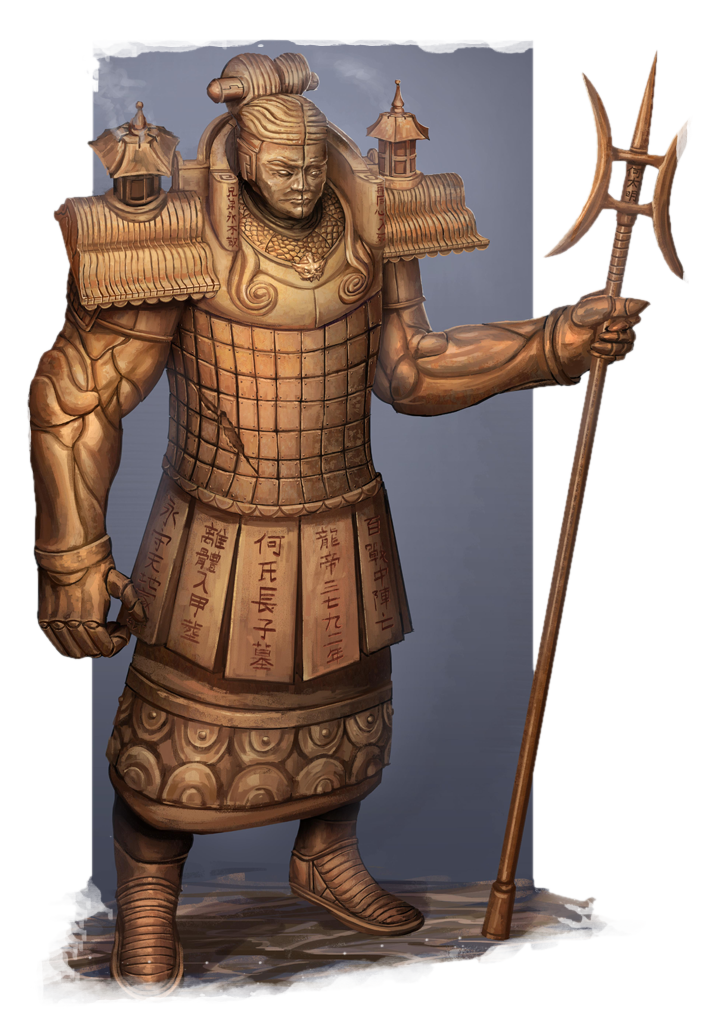 The Imperial fleet is known to patrol the Blue Expanse. Comprising of lithe war-junks and powerful turtle-ships, they protect the coasts from the enemies of their Empire.
Ancient Protectors. The armies of the Dragon Emperoralso include more esoteric forces. Magic, while heavily regulated by the Imperial Magistry, is heavily utilized in the Imperial Army. The Imperial Magistry is, among many things, responsible for the maintenance of ancient golems—disciplined warriors forged with magically reinforced terracotta, and fierce hound-like creatures crafted from magically infused jade.
These terracotta and jade sentinels are remnants of an era long past when the War of the Undying raged across the world. Tales of their creation range from the believable to the legendary, that each was a personally-blessed creation of the Dragon Emperor in a great army to fend off the undead in the war's earliest years. True or not, they stand sentinel all over Khitang, often silent and still for many years, overlooking paddy fields, guarding temples, or partially submerged in rivers. But the light within will burn and the statue will finally move if summoned to a nearby threat. The ultimate warrior in defending Khitang's settlements, they lay waste to anything unlucky enough to approach them.
The Imperial fleet is known to patrol the Blue Expanse. Comprising of lithe war-junks and powerful turtle-ships, they protect the coasts from the enemies of their Empire.
Ancient Protectors. The armies of the Dragon Emperoralso include more esoteric forces. Magic, while heavily regulated by the Imperial Magistry, is heavily utilized in the Imperial Army. The Imperial Magistry is, among many things, responsible for the maintenance of ancient golems—disciplined warriors forged with magically reinforced terracotta, and fierce hound-like creatures crafted from magically infused jade.
These terracotta and jade sentinels are remnants of an era long past when the War of the Undying raged across the world. Tales of their creation range from the believable to the legendary, that each was a personally-blessed creation of the Dragon Emperor in a great army to fend off the undead in the war's earliest years. True or not, they stand sentinel all over Khitang, often silent and still for many years, overlooking paddy fields, guarding temples, or partially submerged in rivers. But the light within will burn and the statue will finally move if summoned to a nearby threat. The ultimate warrior in defending Khitang's settlements, they lay waste to anything unlucky enough to approach them.
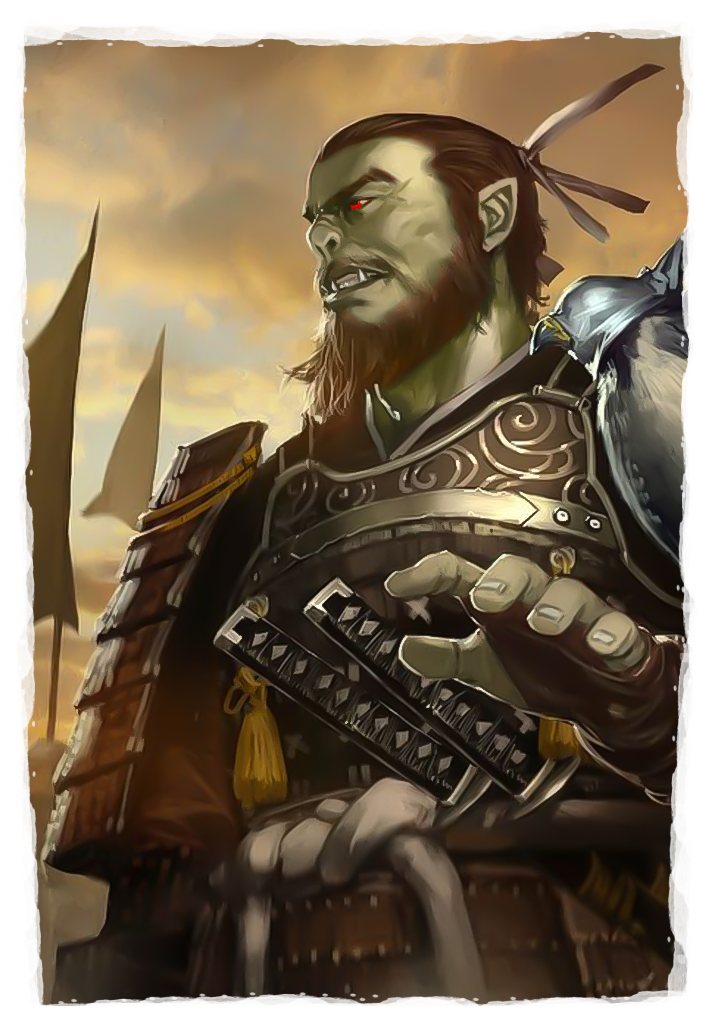 Tao Shun was a bold young man and son of an elder who lead a nomadic tribe of horse-riders from the eastern Rai-Zhu Plains. Under the pale, cold, red moonlight of the Matron, he discovered that Kusatta and his Dark Shamans had been drinking the blood of orc youths, and imprisoning their own people to sacrifice, satiating their addiction. Tao Shun returned swiftly to his people with the word of the horrors he had seen. There was outrage among the rest of the tribes, and Tao Shun rallied their anger and fury into an uprising against the shaman caste. As they spread the word of the caste's true nature to the rest of the steppe tribes, Tao Shun preached for the unity of the orc people in the face of a common foe. Tribes that had warred against each other for generations found a temporary peace, and house rivalries were set aside. The most loyal warriors who joined Tao Shun's side were called the Toshui, and they held fury within their blood.
Tao Shun was a bold young man and son of an elder who lead a nomadic tribe of horse-riders from the eastern Rai-Zhu Plains. Under the pale, cold, red moonlight of the Matron, he discovered that Kusatta and his Dark Shamans had been drinking the blood of orc youths, and imprisoning their own people to sacrifice, satiating their addiction. Tao Shun returned swiftly to his people with the word of the horrors he had seen. There was outrage among the rest of the tribes, and Tao Shun rallied their anger and fury into an uprising against the shaman caste. As they spread the word of the caste's true nature to the rest of the steppe tribes, Tao Shun preached for the unity of the orc people in the face of a common foe. Tribes that had warred against each other for generations found a temporary peace, and house rivalries were set aside. The most loyal warriors who joined Tao Shun's side were called the Toshui, and they held fury within their blood.
 their rite into adulthood, Tao Shun commissioned a legendary blacksmith to craft three powerful jade blades for each of them. Only with each blade sealed into the three locks of the Black Vault could the Infinus Maledus be accessed. Whoever was of imperial lineage and completed the ritual to cleanse the book would be a rightful heir to the throne, so long as they renounced power for the sake of the Empire.
As the Empire's territory grew, Tao Shun's sons managed the burgeoning growth of many provinces. Overseen by Prince Lei-Shun, the eastern provinces encompassed the shores of the Rai-Zhu plains and gave rise to a fortified port town known as Yanganka, which was plagued by centaur raids from the northeast. Lei-Shun also discovered long-lost clans of yunzu—eccentric monkey-like beings that warred with each other amongst the region's easternmost mountains. Diplomacy with them was frustrating at best.
The Rai-Zhu Plains became the favored grounds of the centaurs, who harried trade caravans and hunted orc scouting parties. Their increased boldness was due to a centaur warlord, Ma-Baojin, who had risen to power as the latest in a long line of Khans—leaders of centaur society—by conquering, subduing, or enslaving most other war clans. Ma-Baojin-Khan and his Grand Centaur Khanate raided the Empire's northern villages for food, slaves, and territory, becoming a growing threat and a force to be reckoned with.
Prince Fu-Shun ruled the Phang Mountains in the western provinces and oversaw the isolated temple-city of Xiang-Zoh. Ogres and green-skins plagued the Phang Mountains and fought with local clans of tengu—flightless humanoid avians whose culture of honor and warrior-poetry found kinship with the orcish people. In the western provinces, a close kinship between orcs and tengu blossomed, especially when fending off marauding warbands of oni—ogres who ritualistically infused themselves with powerful infernal magic.
The island of Kin-Zhu off the southern coast of the mainland gave rise to the southern provinces, a close-knit group of regions ruled by Prince Lei-Shun. They were known for their idyllic farming and fishing settlements, which sparsely dotted the rural countryside. The largest settlement became Xuin-Lu, which rapidly grew into a bustling hub of trade. However, territorial disputes and battles with the hostile native kappa eventually began to strain trade with the Empire's mainland.
The Centaur Wars. With the constant need to defend itself on multiple fronts, and the threat of the Khanate to the north, Tao Shunin grew desperate in his later years and turned to Suong-Mei. She proposed diplomacy and peace talks with native peoples instead of warfare. She proposed the integration of the tengu and yunzu clans so they could be protected against their foes, especially against the Khanate. If this was possible, then perhaps other natives of Khitang might follow. This resonated with Tao Shun, who had united the orc peoples once before against a mighty foe. Perhaps Khitang might unite against the Khanate who had already conquered so much of the Empire.
Suong-Mei and the sons of Tao Shun approached the tengu daimyos and yunzu warlords. With words of wisdom, they reasoned that without unity they would all fall before Ma-Baojin-Khan. The tengu agreed to join them in battle, while the yunzu refused and returned to their high mountains; they believed, with amusement, that the centaurs could not climb nor use air magic as they could. There was little sense in fighting a foe that was confined to the ground and thus did not threaten them. With frustration and disappointment, Suong-Mei and the three sons turned their backs and left the yunzu to their mountains.
Tao Shun summoned a thousand legions of warriors, each of them being thousands of men strong. Joining their side, a grand army of united tengu clans were bound by unbreakable oaths to fight and die, not in defense of the Empire, but to safeguard their homelands from the Khanate. Tao Shun's three sons drew their magical blades and followed their father into battle.
A massive, rampaging horde of united Centaur warbands pushed into the northeastern provinces of the Empire, led by Ma-Baojin-Khan himself. Tao Shun, his Toshui warriors, and his three sons met him at a mountain-pass and held Baojin's assault. As the legend goes, the first Emperor battled the Great Khan for hours, and Tao Shun harnessed a hidden resolve within himself, overpowering the massive Centaur with a final surge of fury in one fell swoop, but not before the Great Khan had impaled the Emperor with a spear. As the both of them fell in battle, a large host of tengu warriors descended from the mountains and assaulted Baojin's army from above with devastating arrow fire, sending them in full retreat.
The tengu daimyos and the Empire endured a pyrrhic victory. While the Khanate suffered a lasting defeat that would cripple them for centuries to come, Emperor Tao Shun died in battle, and the tengu daimyos saw many of their kin killed. For the first time, orc and tengu warriors joined to honor the death of the Emperor. With Tao Shun's death, the tengu daimyos formally recognized their close alliance with the Empire. From now on, a fight against one would be a fight against both.
their rite into adulthood, Tao Shun commissioned a legendary blacksmith to craft three powerful jade blades for each of them. Only with each blade sealed into the three locks of the Black Vault could the Infinus Maledus be accessed. Whoever was of imperial lineage and completed the ritual to cleanse the book would be a rightful heir to the throne, so long as they renounced power for the sake of the Empire.
As the Empire's territory grew, Tao Shun's sons managed the burgeoning growth of many provinces. Overseen by Prince Lei-Shun, the eastern provinces encompassed the shores of the Rai-Zhu plains and gave rise to a fortified port town known as Yanganka, which was plagued by centaur raids from the northeast. Lei-Shun also discovered long-lost clans of yunzu—eccentric monkey-like beings that warred with each other amongst the region's easternmost mountains. Diplomacy with them was frustrating at best.
The Rai-Zhu Plains became the favored grounds of the centaurs, who harried trade caravans and hunted orc scouting parties. Their increased boldness was due to a centaur warlord, Ma-Baojin, who had risen to power as the latest in a long line of Khans—leaders of centaur society—by conquering, subduing, or enslaving most other war clans. Ma-Baojin-Khan and his Grand Centaur Khanate raided the Empire's northern villages for food, slaves, and territory, becoming a growing threat and a force to be reckoned with.
Prince Fu-Shun ruled the Phang Mountains in the western provinces and oversaw the isolated temple-city of Xiang-Zoh. Ogres and green-skins plagued the Phang Mountains and fought with local clans of tengu—flightless humanoid avians whose culture of honor and warrior-poetry found kinship with the orcish people. In the western provinces, a close kinship between orcs and tengu blossomed, especially when fending off marauding warbands of oni—ogres who ritualistically infused themselves with powerful infernal magic.
The island of Kin-Zhu off the southern coast of the mainland gave rise to the southern provinces, a close-knit group of regions ruled by Prince Lei-Shun. They were known for their idyllic farming and fishing settlements, which sparsely dotted the rural countryside. The largest settlement became Xuin-Lu, which rapidly grew into a bustling hub of trade. However, territorial disputes and battles with the hostile native kappa eventually began to strain trade with the Empire's mainland.
The Centaur Wars. With the constant need to defend itself on multiple fronts, and the threat of the Khanate to the north, Tao Shunin grew desperate in his later years and turned to Suong-Mei. She proposed diplomacy and peace talks with native peoples instead of warfare. She proposed the integration of the tengu and yunzu clans so they could be protected against their foes, especially against the Khanate. If this was possible, then perhaps other natives of Khitang might follow. This resonated with Tao Shun, who had united the orc peoples once before against a mighty foe. Perhaps Khitang might unite against the Khanate who had already conquered so much of the Empire.
Suong-Mei and the sons of Tao Shun approached the tengu daimyos and yunzu warlords. With words of wisdom, they reasoned that without unity they would all fall before Ma-Baojin-Khan. The tengu agreed to join them in battle, while the yunzu refused and returned to their high mountains; they believed, with amusement, that the centaurs could not climb nor use air magic as they could. There was little sense in fighting a foe that was confined to the ground and thus did not threaten them. With frustration and disappointment, Suong-Mei and the three sons turned their backs and left the yunzu to their mountains.
Tao Shun summoned a thousand legions of warriors, each of them being thousands of men strong. Joining their side, a grand army of united tengu clans were bound by unbreakable oaths to fight and die, not in defense of the Empire, but to safeguard their homelands from the Khanate. Tao Shun's three sons drew their magical blades and followed their father into battle.
A massive, rampaging horde of united Centaur warbands pushed into the northeastern provinces of the Empire, led by Ma-Baojin-Khan himself. Tao Shun, his Toshui warriors, and his three sons met him at a mountain-pass and held Baojin's assault. As the legend goes, the first Emperor battled the Great Khan for hours, and Tao Shun harnessed a hidden resolve within himself, overpowering the massive Centaur with a final surge of fury in one fell swoop, but not before the Great Khan had impaled the Emperor with a spear. As the both of them fell in battle, a large host of tengu warriors descended from the mountains and assaulted Baojin's army from above with devastating arrow fire, sending them in full retreat.
The tengu daimyos and the Empire endured a pyrrhic victory. While the Khanate suffered a lasting defeat that would cripple them for centuries to come, Emperor Tao Shun died in battle, and the tengu daimyos saw many of their kin killed. For the first time, orc and tengu warriors joined to honor the death of the Emperor. With Tao Shun's death, the tengu daimyos formally recognized their close alliance with the Empire. From now on, a fight against one would be a fight against both.
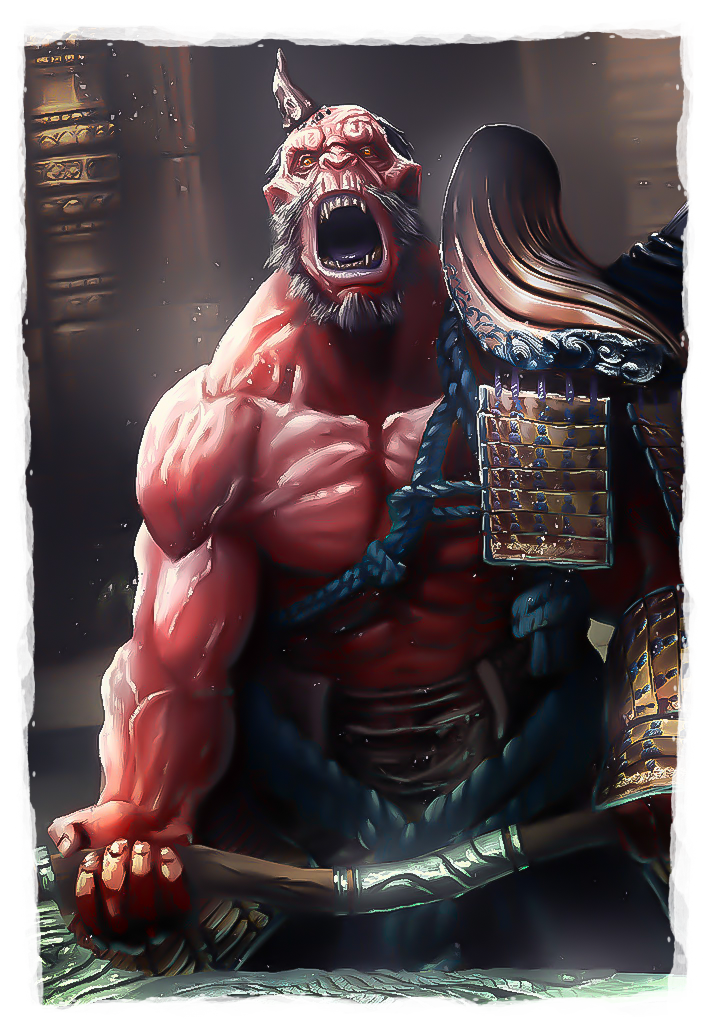 each other to claim Fu-Shun's throne. Darkness clung to Fu-Shun's kingdom and beyond as dark oni shamans spread their doctrine to all corners of the three warring kingdoms, seeking to divide and conquer them. Some orcs were seduced by the power of dark shamanism and returned to the old ways of blood magic. Those loyal to Fu-Shun joined the oni and delved into the depraved energies of the Infernal Abyss.
For centuries time, orcs and oni fought not just one another, but also themselves. Small disagreements spiraled into conflict, violence, and bloodshed. Packs of oni banded together. Clans of orcs emerged by the score and engaged in brutal power struggles. Those who triumphed were quickly toppled by rivals. Through it all, their cultures and languages—even their sense of purpose and identity—began to change. Only the basest instincts of both races prevented annihilation. As either race began to unify in the face of the other, petty conflicts would die down. Orcs would reluctantly band together to stand against the one, and vice-versa. But once the enemy was defeated in a great battle, internal hostilities would surface once again. The other races of Khitang isolated themselves from the fighting and continued to seize territory for themselves in opportunistic guerilla warfare. Old alliances fractured and faded. The tengu daimyos looked upon the orcs ceaseless infighting and dispaired. Their long kinship soured.
Those who refused the influence of the oni saw past their veils of lies. Oni dark shamans, and those who submitted to their influence, were put to the sword. There were many years of bloody mass purges of those skilled in dark magic: those who wove shadows made pacts with fiendish or eldritch creatures, and especially those who were gifted in blood magic. This period of turmoil and conflict became known as the Age of the Tiger, named after the age's common depictions in art as three tiger siblings clawing each other bloody. The three kingdoms edged perilously close to destroying each other from within as brothers turned against brothers, and sons turned against fathers. Even the slightest accusation of dark magic had the risk of a death sentence.
each other to claim Fu-Shun's throne. Darkness clung to Fu-Shun's kingdom and beyond as dark oni shamans spread their doctrine to all corners of the three warring kingdoms, seeking to divide and conquer them. Some orcs were seduced by the power of dark shamanism and returned to the old ways of blood magic. Those loyal to Fu-Shun joined the oni and delved into the depraved energies of the Infernal Abyss.
For centuries time, orcs and oni fought not just one another, but also themselves. Small disagreements spiraled into conflict, violence, and bloodshed. Packs of oni banded together. Clans of orcs emerged by the score and engaged in brutal power struggles. Those who triumphed were quickly toppled by rivals. Through it all, their cultures and languages—even their sense of purpose and identity—began to change. Only the basest instincts of both races prevented annihilation. As either race began to unify in the face of the other, petty conflicts would die down. Orcs would reluctantly band together to stand against the one, and vice-versa. But once the enemy was defeated in a great battle, internal hostilities would surface once again. The other races of Khitang isolated themselves from the fighting and continued to seize territory for themselves in opportunistic guerilla warfare. Old alliances fractured and faded. The tengu daimyos looked upon the orcs ceaseless infighting and dispaired. Their long kinship soured.
Those who refused the influence of the oni saw past their veils of lies. Oni dark shamans, and those who submitted to their influence, were put to the sword. There were many years of bloody mass purges of those skilled in dark magic: those who wove shadows made pacts with fiendish or eldritch creatures, and especially those who were gifted in blood magic. This period of turmoil and conflict became known as the Age of the Tiger, named after the age's common depictions in art as three tiger siblings clawing each other bloody. The three kingdoms edged perilously close to destroying each other from within as brothers turned against brothers, and sons turned against fathers. Even the slightest accusation of dark magic had the risk of a death sentence.
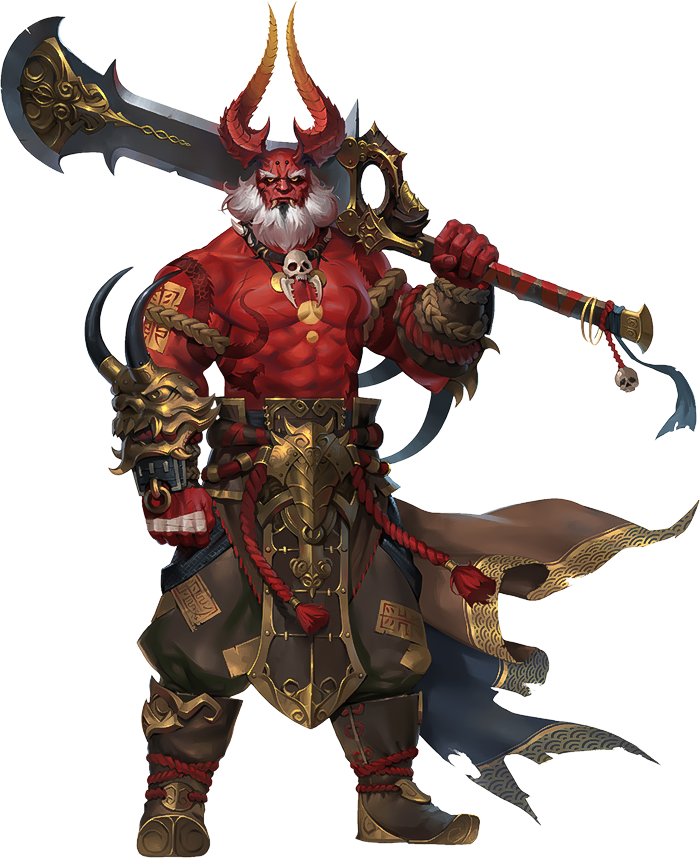 Under Mogu-Ra, prosperity and brutality gripped Khitang. For the oni, it was the beginning of a glorious new empire, but for the region’s other races, it marked the start of an age of tyranny as the Sorcerer King began a campaign of enslavement. The noble tengu and enigmatic yunzu had established small empires of their own. Though they fought valiantly, the yunzu, tengu, and orcs ultimately crumbled before the might of Mogu-Ra. The oni sacked their towns and left their civilizations in ruins. Mogu-Ra forbade the subjugated races from learning how to read or write, or even how to speak any language other than the oni tongue. To disobey was to be killed in a slow, brutal fashion.
The oni forged their greatest palaces and monuments with the blood and sweat of their subjugated races. Soon, the empire boasted a unified language, an established system of weights and measurements, and the first set of written laws in Khitang—brutal codes that enshrined the oni's place above other creatures.
The Oni-Centaur Wars. However, beyond the mountain pass into Khitang, an old foe re-emerged. Once again, the centaur warbands rallied and gave rise to a new Khan. He was as brutal as he was imposing. Baitung Mal-Khan, a descendant of the once great Ma-Baojin-Khan, was a warrior prophet of the centaur's horse god, and he rallied the other clans to his cause, forming a new Khanate even greater than the first.
Mongu-Ra's hesitancy to declare war on the Khanate infuriated his eldest son, Gheng-Ra, who later had his own father assassinated. Now under the rule of a new Emperor far more brutal than his predecessor, the oni battled against the new Khanate for many years in a war of attrition, and the oni threw their subjugated populace against Baitung Mal-Khan as foot soldiers and conscripts. Apart from those who were sent to fight the centaurs, no slave was ever permitted to touch a weapon—a crime punishable by death.
The Great Wall. During the height of the Oni-Centaur wars, Gheng-Ra ordered the construction of a mighty bastion hundreds of miles long and hundreds of feet tall to keep the centaur Khanates out of Khitang. It served as a cruel mockery of the centaur race, as Gheng-Ra believed they could not climb. Thousands of slaves perished in the construction of the massive wall, and many generations of sweat, bones, and blood served as the wall's mortar. Slaves who displeased Gheng-Ra would have their children sent to the wall to suffer and die as fodder.
Under Mogu-Ra, prosperity and brutality gripped Khitang. For the oni, it was the beginning of a glorious new empire, but for the region’s other races, it marked the start of an age of tyranny as the Sorcerer King began a campaign of enslavement. The noble tengu and enigmatic yunzu had established small empires of their own. Though they fought valiantly, the yunzu, tengu, and orcs ultimately crumbled before the might of Mogu-Ra. The oni sacked their towns and left their civilizations in ruins. Mogu-Ra forbade the subjugated races from learning how to read or write, or even how to speak any language other than the oni tongue. To disobey was to be killed in a slow, brutal fashion.
The oni forged their greatest palaces and monuments with the blood and sweat of their subjugated races. Soon, the empire boasted a unified language, an established system of weights and measurements, and the first set of written laws in Khitang—brutal codes that enshrined the oni's place above other creatures.
The Oni-Centaur Wars. However, beyond the mountain pass into Khitang, an old foe re-emerged. Once again, the centaur warbands rallied and gave rise to a new Khan. He was as brutal as he was imposing. Baitung Mal-Khan, a descendant of the once great Ma-Baojin-Khan, was a warrior prophet of the centaur's horse god, and he rallied the other clans to his cause, forming a new Khanate even greater than the first.
Mongu-Ra's hesitancy to declare war on the Khanate infuriated his eldest son, Gheng-Ra, who later had his own father assassinated. Now under the rule of a new Emperor far more brutal than his predecessor, the oni battled against the new Khanate for many years in a war of attrition, and the oni threw their subjugated populace against Baitung Mal-Khan as foot soldiers and conscripts. Apart from those who were sent to fight the centaurs, no slave was ever permitted to touch a weapon—a crime punishable by death.
The Great Wall. During the height of the Oni-Centaur wars, Gheng-Ra ordered the construction of a mighty bastion hundreds of miles long and hundreds of feet tall to keep the centaur Khanates out of Khitang. It served as a cruel mockery of the centaur race, as Gheng-Ra believed they could not climb. Thousands of slaves perished in the construction of the massive wall, and many generations of sweat, bones, and blood served as the wall's mortar. Slaves who displeased Gheng-Ra would have their children sent to the wall to suffer and die as fodder.
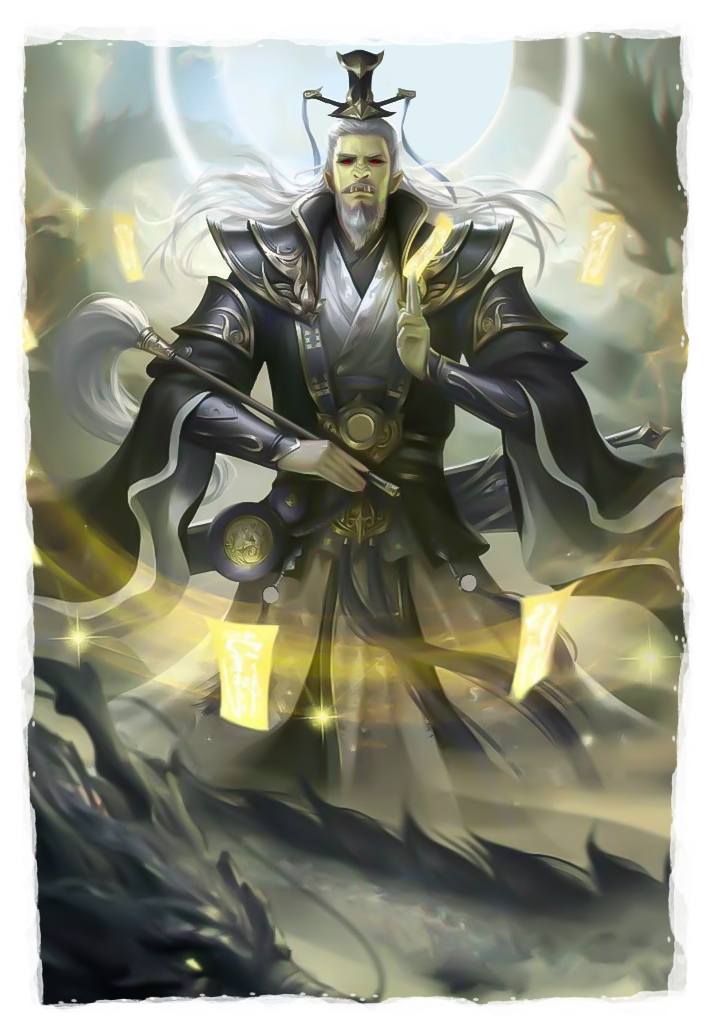 When he had finally mastered his techniques, he challenged his fellow slaves to strike him. None could. His “dancing,” his flowing movements, kept him free of harm. The slaves begged Hao-Shin to teach them how to fight unarmed. Hao-Shin did, and word of this strange new combat method spread quickly among the oppressed peoples of the Oni Empire.
Hundreds of slaves adopted Hao-Shin’s teachings and devoted themselves to learning this newfound art, known thereafter as the way of the monk. When rumors of the movement reached oni ears, Hao-Shin relocated his followers to the Taolong Forest, aware that his apprentices were not yet strong enough to topple their oppressors. In secret, the rebels built a monastery among the enormous bamboo thickets and tree trunks and began to further train themselves as instruments of justice.
The Wisdom of Ki. It was at this monastery that the three advisors revealed their true forms to Hao-Shin, and revealed the secrets of inner strength that lay within every heart and soul called 'Ki'—a source of energy inherently connected to the Cosmic Etherium. Hao-Shin passed their wisdom to his followers. At last, they were ready to fight.
When he had finally mastered his techniques, he challenged his fellow slaves to strike him. None could. His “dancing,” his flowing movements, kept him free of harm. The slaves begged Hao-Shin to teach them how to fight unarmed. Hao-Shin did, and word of this strange new combat method spread quickly among the oppressed peoples of the Oni Empire.
Hundreds of slaves adopted Hao-Shin’s teachings and devoted themselves to learning this newfound art, known thereafter as the way of the monk. When rumors of the movement reached oni ears, Hao-Shin relocated his followers to the Taolong Forest, aware that his apprentices were not yet strong enough to topple their oppressors. In secret, the rebels built a monastery among the enormous bamboo thickets and tree trunks and began to further train themselves as instruments of justice.
The Wisdom of Ki. It was at this monastery that the three advisors revealed their true forms to Hao-Shin, and revealed the secrets of inner strength that lay within every heart and soul called 'Ki'—a source of energy inherently connected to the Cosmic Etherium. Hao-Shin passed their wisdom to his followers. At last, they were ready to fight.
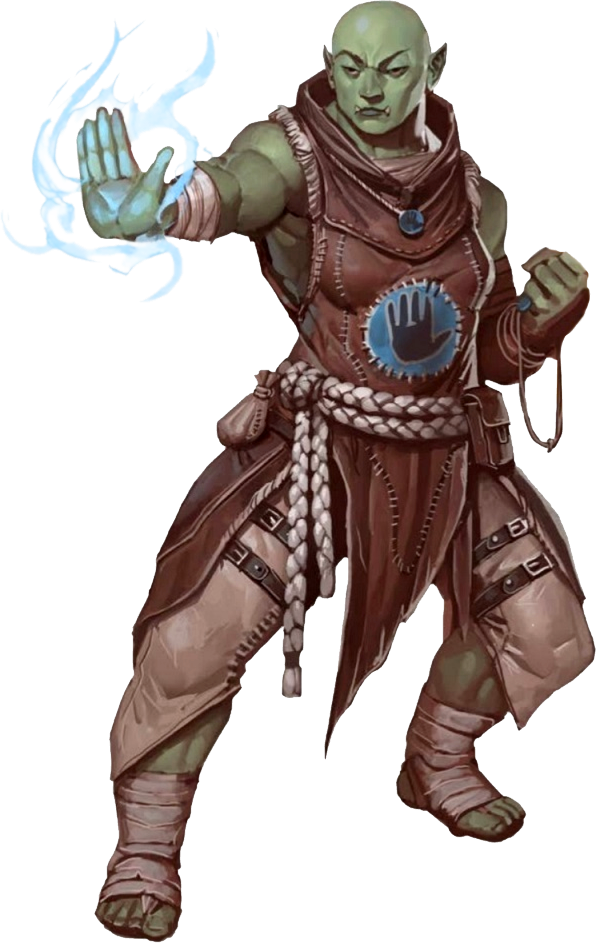 falling Oni Empire as an opportunity to overwhelm Khitang. The dragon siblings took many injuries as they fought alongside the free, united slaves. Eventually, between decades of fighting Gheng-Ra's forces to a grinding stalemate, and the unexpected uprising of the Empire's slaves, the second great Khanate retreated, whittled down to a negligible threat.
Eventually, Gheng-Ra's forces fled to the Phang Mountains, the royal seat of the Oni Empire. Hao-Shin personally led the charge, striking deep into the mountains. He fought Gheng-Ra hand to hand. Summoning every ounce of his Ki, he let loose a cataclysmic breath of radiant fire that turned the tyrant to ash, but not before the orc sustained life-threatening wounds. It took years for Hao-Shin to recover under the care of his advisors.
So began a time of peace and prosperity in Khitang. The orcs, along with the other races that called the region home, flourished. A new empire—one built on the principles of justice, wisdom, and benevolence—emerged to watch over the war-torn land. Hao-Shin was crowned the first Dragon Emperor. No longer was this an empire of just orcs, but of many free peoples bound together in warfare and oppression. This new empire would be the Empire of the Celestial Dragon, named after the dragons from the stars he first saw in his vision.
After the coronation, Hao-Shin made his advisors promise him that if Khitang was ever at risk of plunging into chaos again, they would take over as its benevolent guardians.
falling Oni Empire as an opportunity to overwhelm Khitang. The dragon siblings took many injuries as they fought alongside the free, united slaves. Eventually, between decades of fighting Gheng-Ra's forces to a grinding stalemate, and the unexpected uprising of the Empire's slaves, the second great Khanate retreated, whittled down to a negligible threat.
Eventually, Gheng-Ra's forces fled to the Phang Mountains, the royal seat of the Oni Empire. Hao-Shin personally led the charge, striking deep into the mountains. He fought Gheng-Ra hand to hand. Summoning every ounce of his Ki, he let loose a cataclysmic breath of radiant fire that turned the tyrant to ash, but not before the orc sustained life-threatening wounds. It took years for Hao-Shin to recover under the care of his advisors.
So began a time of peace and prosperity in Khitang. The orcs, along with the other races that called the region home, flourished. A new empire—one built on the principles of justice, wisdom, and benevolence—emerged to watch over the war-torn land. Hao-Shin was crowned the first Dragon Emperor. No longer was this an empire of just orcs, but of many free peoples bound together in warfare and oppression. This new empire would be the Empire of the Celestial Dragon, named after the dragons from the stars he first saw in his vision.
After the coronation, Hao-Shin made his advisors promise him that if Khitang was ever at risk of plunging into chaos again, they would take over as its benevolent guardians.
 Suto was no exception. He was Emperor Kanai Soulseeker's most loyal friend, second only to the three advisors. Suto became the Emperor's personal bodyguard. However, while loyal, was also ambitious and keen to display his swordsmanship.
Records tell of when he famously vanquished an attempt on Emperor Kanai's life by assassins sent by the Kao-Tun, a brotherhood of oni crimelords that plagued the deep underbelly of Xuin-Lu. His more bloodthirsty nature revealed itself when he confronted a group of organized rebel mages and arcanists who had captured Kanai's son. As punishment, Suto mercilessly slaughtered them all in front of the boy and mounted their heads on pikes outside of the Imperial Palace.
Suto's ambitions turned dark when he began to receive whispers. During his dreams, the voice infected him with doubt and paranoia. The voice told him of the Infinus Maledus locked away beneath the Temple of the Celestial Dragon. Only he, the Emperor, and the highest echelons of the Empire knew of the black book. Once every year during the Day of the Dragon, the book was unshackled and brought to the temple's summit. There, a ritual of cleansing would take place, praise to the celestial heavens would be chanted, and Imperial blood would be shed to subdue the book's corruption for another year.
The voice told Suto that Emperor Kanai would betray and murder him during the ritual. To prevent this, Suto was told to absorb the magic of the book and kill Kanai before the Emperor could use it against him.
Suto, the Betrayer. At the summit of the Temple of the Celestial Dragon, Suto cut down his fellow guardsmen and stole the book. In the middle of absorbing its power, he slew his master and former friend in the center of the chamber, as well as the rest of Kanai's children, ending the Soulseeker bloodline.
Momentarily escaping Suto's slaughter, the ritual ministers struck the ceremonial gong of the temple, alerting the three dragons. Bloodfang killed the soldiers that rushed to aid the Emperor until only the three dragons in humanoid form remained. They took up the three legendary jade blades left by Kanai's fallen sons, and in one unified swing, all three blades cut down the betrayer.
Suto's death wail triggered the Jade Storm.
The storm spread out in a shockwave, turning the sea between Kin Zhu Isle and the mainland into solid jade, and the Taolong Forests, and the creatures within it, to stone. The echoes of the death wail itself are said to have lasted hours.
Despite being untouched by the Jade Storm, even Xuin Lu City suffered from the event. A massive influx of refugees strained food supplies, and Xuin-Lu's population and poverty rate increased suddenly dramatically. The cataclysmic event devastated the Empire and nearly plunged it into chaos.
Suto was no exception. He was Emperor Kanai Soulseeker's most loyal friend, second only to the three advisors. Suto became the Emperor's personal bodyguard. However, while loyal, was also ambitious and keen to display his swordsmanship.
Records tell of when he famously vanquished an attempt on Emperor Kanai's life by assassins sent by the Kao-Tun, a brotherhood of oni crimelords that plagued the deep underbelly of Xuin-Lu. His more bloodthirsty nature revealed itself when he confronted a group of organized rebel mages and arcanists who had captured Kanai's son. As punishment, Suto mercilessly slaughtered them all in front of the boy and mounted their heads on pikes outside of the Imperial Palace.
Suto's ambitions turned dark when he began to receive whispers. During his dreams, the voice infected him with doubt and paranoia. The voice told him of the Infinus Maledus locked away beneath the Temple of the Celestial Dragon. Only he, the Emperor, and the highest echelons of the Empire knew of the black book. Once every year during the Day of the Dragon, the book was unshackled and brought to the temple's summit. There, a ritual of cleansing would take place, praise to the celestial heavens would be chanted, and Imperial blood would be shed to subdue the book's corruption for another year.
The voice told Suto that Emperor Kanai would betray and murder him during the ritual. To prevent this, Suto was told to absorb the magic of the book and kill Kanai before the Emperor could use it against him.
Suto, the Betrayer. At the summit of the Temple of the Celestial Dragon, Suto cut down his fellow guardsmen and stole the book. In the middle of absorbing its power, he slew his master and former friend in the center of the chamber, as well as the rest of Kanai's children, ending the Soulseeker bloodline.
Momentarily escaping Suto's slaughter, the ritual ministers struck the ceremonial gong of the temple, alerting the three dragons. Bloodfang killed the soldiers that rushed to aid the Emperor until only the three dragons in humanoid form remained. They took up the three legendary jade blades left by Kanai's fallen sons, and in one unified swing, all three blades cut down the betrayer.
Suto's death wail triggered the Jade Storm.
The storm spread out in a shockwave, turning the sea between Kin Zhu Isle and the mainland into solid jade, and the Taolong Forests, and the creatures within it, to stone. The echoes of the death wail itself are said to have lasted hours.
Despite being untouched by the Jade Storm, even Xuin Lu City suffered from the event. A massive influx of refugees strained food supplies, and Xuin-Lu's population and poverty rate increased suddenly dramatically. The cataclysmic event devastated the Empire and nearly plunged it into chaos.
A Civilization of Mystery
The Empire of the Celestial Dragon has many names: The Empire of Stars, the Kingdom of dragons, and the Grand Empire of Xuin-Lu to name a few. It is the primary populous nation of orcs located in the far southeastern reaches of the continent of Maitreya and holds rightful dominion over the expansive regions of Khitang. Populations of humans, tengu, yunzu, and even some Sharr clans also call this nation home. The travelers that return from Khitang tell tales of great gold and jade pagodas, and the inexhaustible armies of the eastern rulers. They bring exotic spices, fine silks, gleaming gold, luxurious porcelain vases, and all manner of strange and wonderful items from the Kingdom of Dragons—glimpses of the mysterious glory of the distant and rich orient.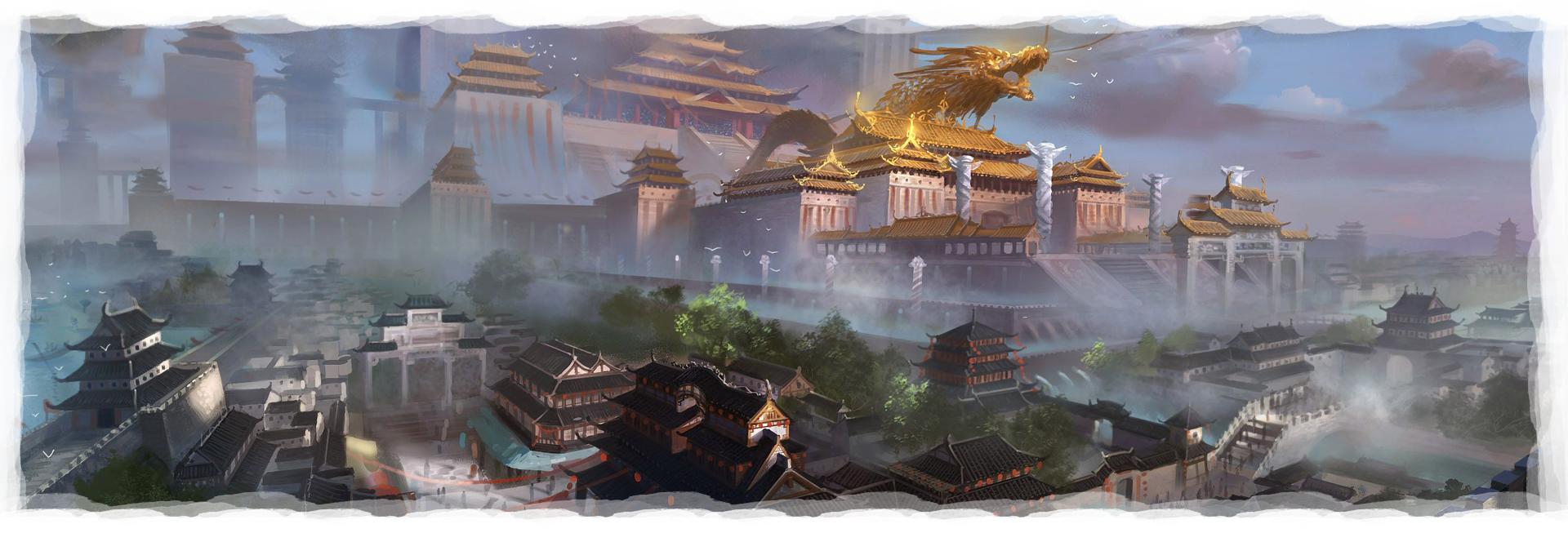
The Dragon Emperor
The Empire of the Celestial Dragon is ruled by the Celestial Dragon Emperor. Considered a deific figure by the Empire's citizens and the closest thing to a god in humanoid form, the Dragon Emperor is said to be granted a degree of power over the stars and heavens. To this degree, the Emperor is revered as an oracle, blessed with limited insight into both the past and present. The Current Dragon Emperor, Chu-Yin Soulseeker, rules over the Empire with a watchful eye and a thoughtful gaze wizened over the many years of his reign. Beneath the Emperor reigns a small group of lesser monarchs—referred to as Matriarchs and Patriarchs, or 'Administrators'—who are loyal to the Emperor. They rule over Khitang's smaller provinces and oversee their daily management, including but not limited to military, agriculture, education, diplomacy, and the proliferation of arts and culture. These monarchs are granted titles that honor celestial bodies, either by themselves, or by the people they rule over, such as 'Sun Emperor', 'Moon Empress', or the 'Comet of the East'.Provinces of Khitang
Western Provinces. Ju-Ming Farseer, the Star Empress, is the Matriarch of the temple city of Xiang Zoh, and ruler over the western provinces and the Phang Mountains. Ju-Ming confers with the Dragon Emperor on the movements of the heavens and oversees the cultural proliferation of spirituality throughout the Empire. Ju-Ming believes in the concept of balance between dark magic and light magic—dark and light energy. Yin and Yang. It is a philosophy first proliferated by Suong-Mei, an ancient religious leader and spiritual teacher who achieved enlightenment.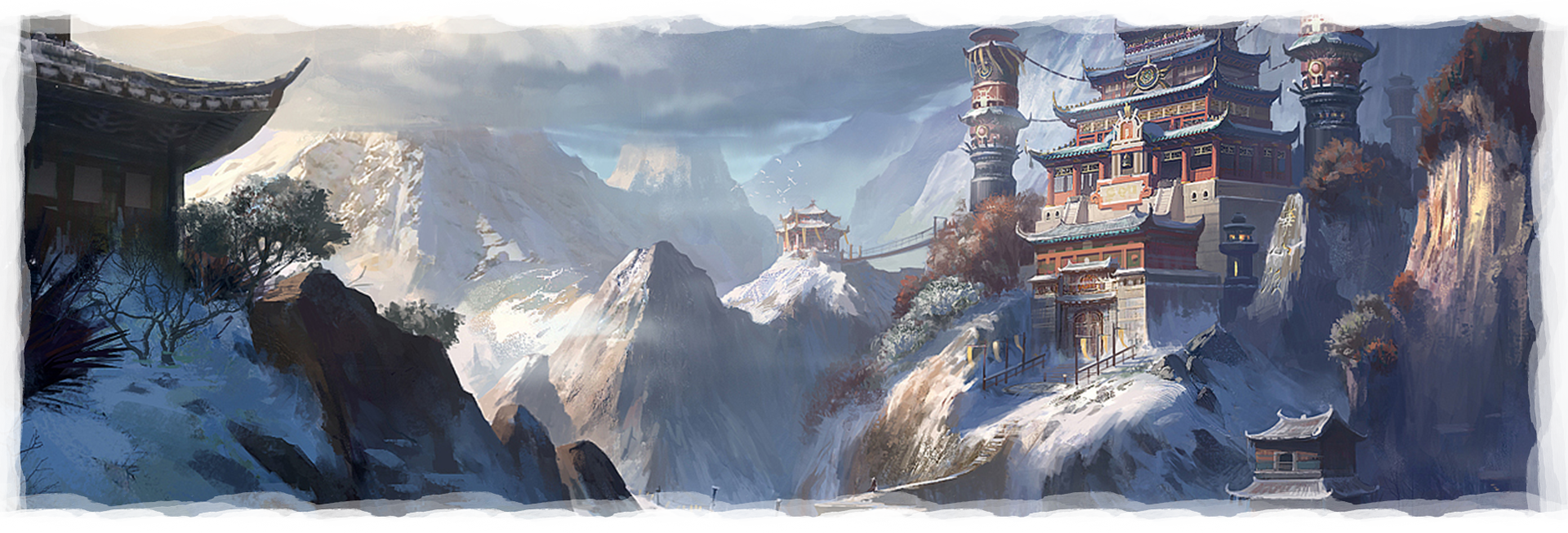
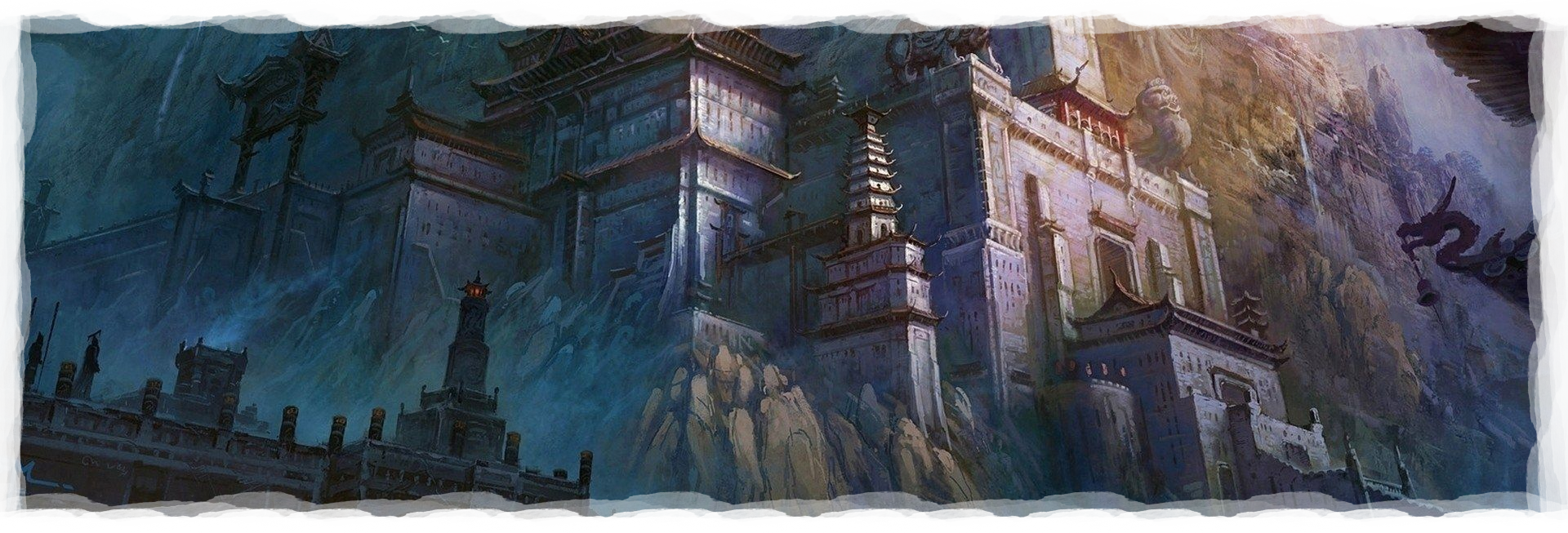
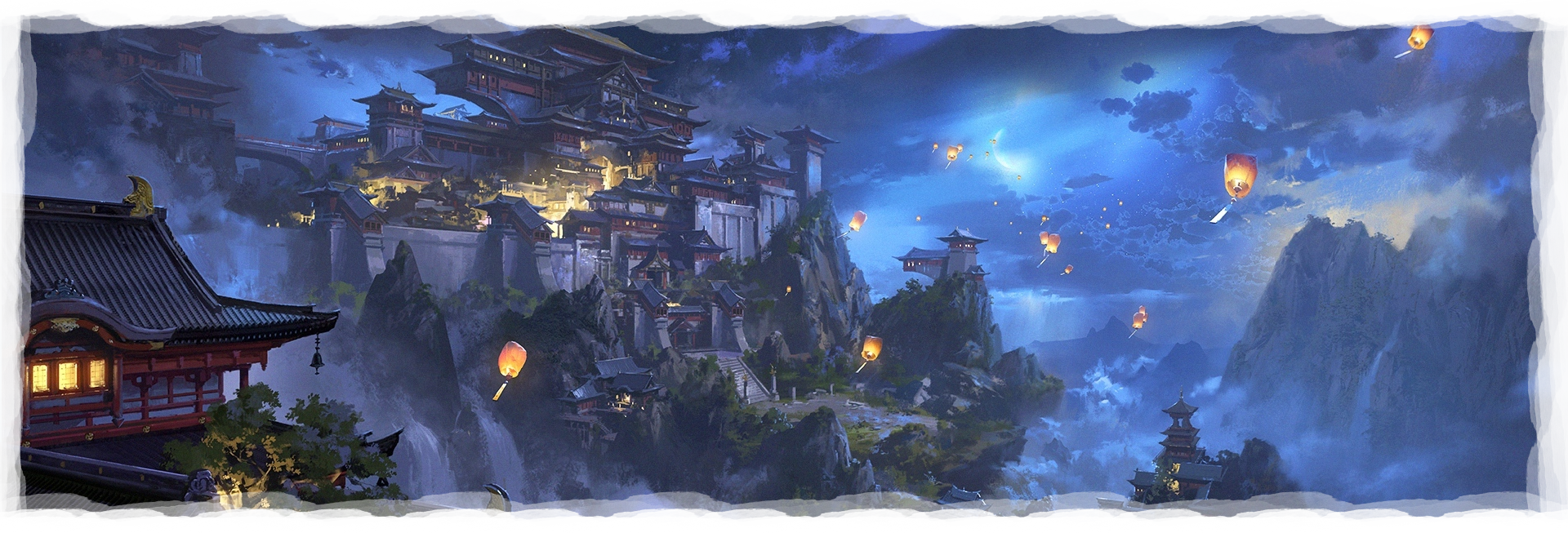
Dragon Rulers
These benevolent rulers, and the Emperor himself, are remarkably long-lived. Unbeknownst, to the wider populace, only the rulers and those closest to them know their true nature. These individuals are Shen Dragons in disguise. Wizened beyond measure, they are the oldest Shen Dragons in the world, and it is their purpose to keep their people safe from what they see as the turmoil and tumult of the wider world. The Dragon Emperor and his children have taken many names and forms throughout the centuries and have guided the Empire on a single path towards isolation from the wider world. The Celestial Bureaucracy, an order of administrative seers, royal guards, oracles, and monks close to the Dragon Emperor, keeps this secret from the general public. This hierarchy is not without its disconnects between the Empire's dragon leadership and its mortal populace. The decrees of the Dragon Emperor may sometimes seem odd to the wider populace, but in truth, they may serve some greater purpose decades from the times they are signed into law. Only then may the Dragon Emperor's prophetic wisdom be revealed. The dragon rulers of the Empire see time on a much grander scale than their mortal subjects and can afford to make long-term plans.Imperial Might
The Grand Imperial military is vast and exceptionally powerful, but only because it has to be, for the peoples of the Empire fight not only against rampaging green-skins, marauding centaurs, and Oni warbands but also until very recently the might of the Kiteshi Empire to the north. The north of Khitang is protected by the Dragon's Spine Wall—a colossal structure that stretches for hundreds of miles and is large enough to require a garrison tens of thousands strong. The armies of Khitang and its provinces are said to be innumerable, and draw exotic warriors from all across the realm, including fierce hill people, strange warrior monks, disciplined and honorable bird-like people, and odd monkey-like mercenary warriors. The orcs comprise well-disciplined legions supported by heavily armored warriors and ornate cannons. The mainstay of the Grand Imperial Army is the numerous Bannermen, oath-sworn and stalwart warriors that wear emerald green back banners, wield long curved swords, wicked polearms, and crossbows, and are famous for standing their ground however badly outnumbered. The Dragon Emperor's bodyguard, known as the Palace Guard, is known to wear lacquered scale armor and display banners with Dragon motifs. Imperial warriors, or at least their officers, study military doctrines first crafted by the legendary Tao Shun and learn acrobatic martial arts to some degree. Gunpowder technology is known in the Empire and is used both in ornate, snarling-mouthed bronze cannons that shoot clusters of bronze javelins. They also use enchanted fireworks of lambent green and ice white light, that turn the night into a rippling phantasm of spectral figures which turn and roar in a crazed display.
Yin & Yang
Magic has a long history among the people of Khitang. In their tradition, dark magic and light magic—known as Yin and Yang, respectively—are both held as sacred energies. Sometimes Khitanese peoples craft fine pendants, bowls, rings, or other trinkets that serve as protective amulets or trinkets against all forms of hostile magic, except for Yin and Yang. The strongest and most revered type of magic practiced across Khitang is Astromancy, also called celestial magic. This unique magic saw its most widespread use during the dynasty of Hao-Shin Soulseeker, the first Dragon Emperor. Celestial magic, much akin to Khitanese spiritual beliefs, is divided into both dark energy and light energy—Yin and Yang. The magic of Yang focuses on bolstering allies with resolute belief or disrupting enemies with walls of wind. In particularly dire situations it can also unleash mighty explosions upon the enemy, bringing with it the power of the Dragon Emperor himself. The magic of Yin is a more esoteric school, with the power to reflect projectiles or summon the ghosts of the dead to avenge themselves in battle. Those who practice it can shield their allies behind obfuscation and remove foes in the dead of night.History of the Empire
The War of Broken Chains saw an upheaval of the old world order where the giants of the Ak'teshi Empire held dominion as the world's most powerful civilization. However, as powerful as their grip was, centuries of conflict with dragons during the Brood War had brought this once mighty empire to the brink of ruin. When Kusatta the Bloodied assisted Cairn's uprising and fought back the Ak'teshi with his own army of the undead, risen from what would eventually become the Morbog, the Ak'teshi's fate and eventual fall were sealed. After the Ak'teshi remnants fled and victory was claimed, Cairn confronted Kusatta about the vileness of Dark Shamanism and how it had transformed him and his followers into orcs—bloodthirsty practitioners of horrific magic. Kusatta and his orcs were exiled far from the lands they once called home and wandered for many years. They traveled on foot and sailed by boat by the thousands, gradually venturing to the far eastern steppes of Maitreya. Kusatta's corrupting magic gnawed at his mind for decades; he fueled his long life by surreptitiously devouring the life of others. During his travels, he authored the Infinus Apocryphum, the book of the Damned, and wrote down every evil, meandering thought and practice. He became Kusatta, the Bloody Mad. As they traveled, his followers grew increasingly divided between those who had lost faith in Kusatta's ways, and the powerful few who remained loyal addicted to the power that Dark Shamanism provided. Few dared stand against the shaman caste who sequestered themselves deep within the Phang Mountains. Only one orc warrior came to power and defied them.Tao Shun

Battle of the Phang Mountains
Legends say the sea of horse-riders that charged the Dark Shaman's mountain-fortress was so massive that the thunder of hooves threw a cloud of dust that blotted out the sun. A great battle took place, and many fell. Many stories tell of Tao Shun's ascent to the top of a looming stone fortress, and how, after a day and a night of constant battle, the legendary warrior cut down Kusatta. This would have been the Dark Shaman's end had the sorcerer not bound his soul to the Infinus Apocryphum. Tao Shun took the dark tome with the desire to destroy it entirely. Holding aloft the broken staff of Kusatta, his people bowed before him, and he was proclaimed the leader of a newly enlightened people who would shed their reliance on Dark Shamanism.Birth of the Orcish Empire
Tao Shun turned his attention to the southern realms where the land was fertile. Many settled into a life of agriculture and built new existences for themselves. A nascent empire grew across these provinces which came to be collectively known as 'Khitang', or 'Paradise' in the Orcish tongue. United under his wise leadership, Tao Shun was coronated as the first Emperor of the Orcish Empire. Remnants of the Toshui became an elite caste of royal guards loyal to the Emperor who followed the warrior philosophy of Tao Shun. He thought of war as a calculative and intellectual art form, and his works were transcribed to parchment for future generations: 'Tao Shun: The Art of War'. The warrior philosophers and poets of the Toshui became the first samurai. Suong-Mei & The Black Vault. As one of Tao Shun's first acts, he sought out the most powerful seers and spiritualists from across the Khitang and beyond to aid him in rendering the Infinus Apocryphum inert and imprisoning Kusatta's soul forever. Many tried and failed until he discovered Suong-Mei. She was a wanderer who gained a loyal following of shamans who practiced the elemental arts and was gifted with the healing energies of water. Out of desperation and necessity, she and her shamans conducted clandestine and taboo rituals. They performed blood rites and sacrifices, separating the corrupting ink of the book into three tomes of black pages: The Infinus Mortis, Infinus Maledus, and Infinus Sanguis. Suong-Mei's shamans spread two of them to the far corners of the world, locking them up to never be rediscovered. The Infinus Maledus remained with Tao Shun where he ordered it to be buried far beneath the land in an impenetrable Black Vault. To keep the book inert and to prevent catastrophe to the Orcish Empire, Tao Shun, Suong-Mei, and her seers brought the book to the peak of their mountain temple of Xiang-Zoh every year during the Harvest Festival. There, they would pray to the heavens and, with a drop of Tao Shun's blood, temporarily wash away its corruption. Suong-Mei joined Tao Shun's side after his ascension to the throne, inspiring the growing populace with her diplomatic wisdom and charm. An empathic healer, she brought reason, empathy, and balance to the often hardline stances of Tao Shun. Many sonnets and stories waxed poetically about her philosophies; if one were to survive in the world, one must flow like water—to run like a river rapid or drift like a calm pond when necessary. She preached pacifism and asceticism and told her followers to shed their worldly possessions in order to achieve wu: enlightenment in the orcish tongue. This partnership grew into love. Suong-Mei and Tao Shun had three sons together and the Emperor trained them to become capable and skilled swordsmen. As part of
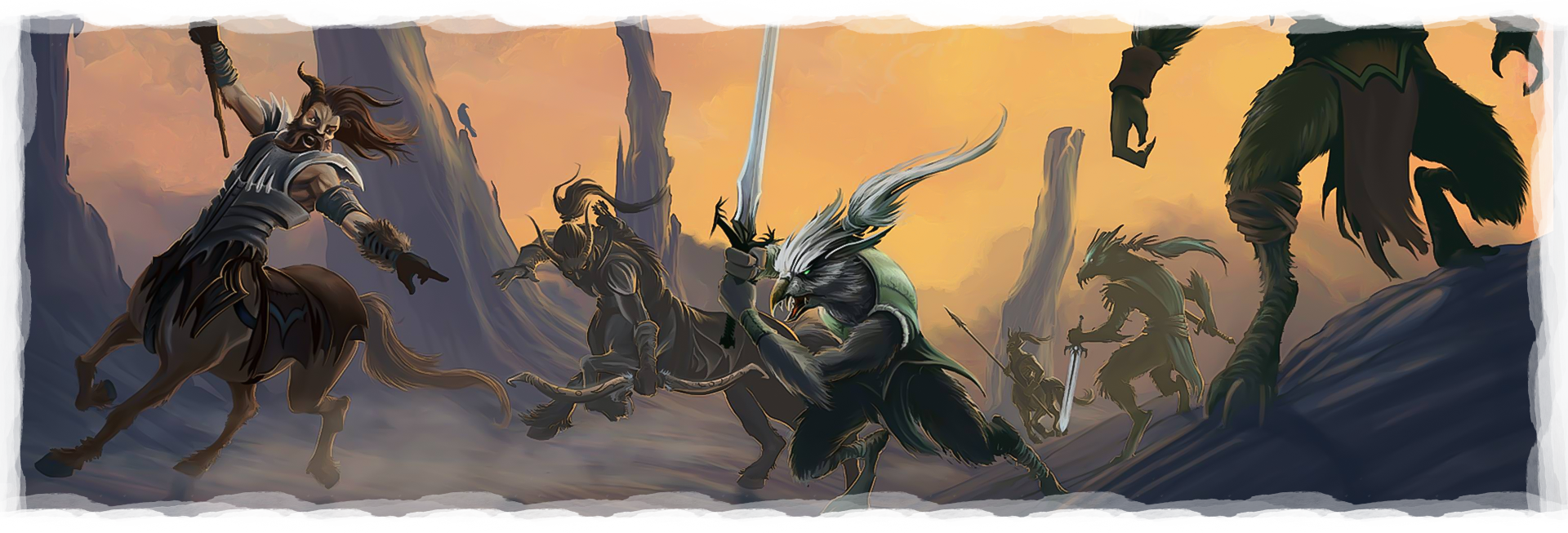
Age of the Tiger
In the years after Tao Shun's death, Suong-Mei found herself in declining health, and she too passed, but her legacy lived on in her spiritual teachings, which became an integral part of orc philosophy. However, despite Suong-Mei's timeless words, disunity wove its way through the fabric of society. Tao Shun's three sons disputed each other's claims to the throne, and the bond between the Empire's three provinces weakened. The day before the Harvest Festival, Fu-Shun pleaded with his brothers to meet him at the vault so that the ritual could take place and keep the Empire from splitting, but it was a deception. When Lei-Shun and Jhiao-Shun locked their blades into the vault, Fu-Shun butchered his unarmed brothers in cold blood, seeking to take power for himself. He felt he did not need to cleanse an old dusty tome every year to hold on to power, only his legendary blade. In truth, the latent darkness of Kusatta's presence within the Infinus Maledus had blackened Fu-Shun's heart—he was weak of mind and spirit. To solidify his rule, he initiated a truce with the oni warbands of the Phang Mountains. In exchange for a prominent place in his new Empire, they taught him how to use infernal magic. With the assistance of Fu-Shun's newfound power, oni dark shamans began a mass purge of tengu from the Phang Mountains and conquered their former homelands. The other provinces broke away from Fu-Shun's rule, as they believed him to be a traitor to Tao Shun's legacy. The Empire fractured into warring kingdoms and collapsed into upheaval. The opportunistic yunzu clans claimed territory to the far north-east, united under an enigmatic and eccentric 'Monkey King' in exchange for their loyalty with the eastern provinces, which came under rule by many orc warlords who claimed power and were overthrown soon after. The southern provinces on Kin Zhu Isle began to seize land across the coasts of Khitang, and seafaring warlords took in tengu refugees from the Phang Mountains in Fu-Shun's western provinces. Kin-Zhu Isle became a safe haven for the tengu, who fought alongside the armies of the south to retake their homeland. After his death in battle against the Southern Provinces, Fu-Shun was given the cursed title, 'The Fallen Prince', and generations of opportunistic oni warlords battled
Age of the Oni
Oni warbands took power over the western provinces after the assassination of the last of Fu-Shun's lineage. While the orcs fought each other in the east and south, the oni had conquered nearly the entirety of the former territories of the once united Empire. It was during this time that Mogu-Ra came to power. Mogu-Ra. A descendant of a minor oni warlord, young Mogu-Ra was accustomed to the brutality of clan warfare. Despite his skill and success in battle, he saw the incessant conflicts and political maneuvering as a betrayal of the oni's potential. Nevertheless, he remained stalwart as a vassal for his father. A close advisor eventually betrayed and murdered Mogu-Ra's father. Almost all of the fallen warlord’s clansmen sought refuge in the ranks of other clans, abandoning Mogu-Ra. Only a few loyal armsmen refused to leave his side. Mogu-Ra sought vengeance for his father's death. He hired assassins to slaughter three great warlords who had possession of the legendary jade swords of Tao Shun and broke into the long-lost Black Vault beneath the mountains. He stole the Infinus Maledus and wielded its full power. Might beyond understanding flooded through Mogu-Ra's soul. When he emerged from the vault and met with his armsmen, they were in awe of him. Rumors of Mogu-Ra's newfound might spread among the oni clans. Some believed he had torn out the heart of a death god and eaten it. Others whispered that he was Kusatta reborn. All stories had one fact in common: this “Sorcerer King” demanded that all oni bow before him. He claimed the birthright of Emperor, and he would destroy all those who refused to yield.The Oni Empire
Mogu-Ra set out to unify the oni race and forge a new destiny as the masters of Khitang. The petty squabbling and warfare that had plagued their kind would no longer be tolerated. With curses and dark sorcery woven at his command, Mogu-Ra crushed all opposition. The fortunate ones were killed quickly; the unfortunate ones were kept in chains. Most of the oni rallied to him out of fear, but his “miracles” soon inspired devotion. The Sorcerer King had mastered the Book of Curses.
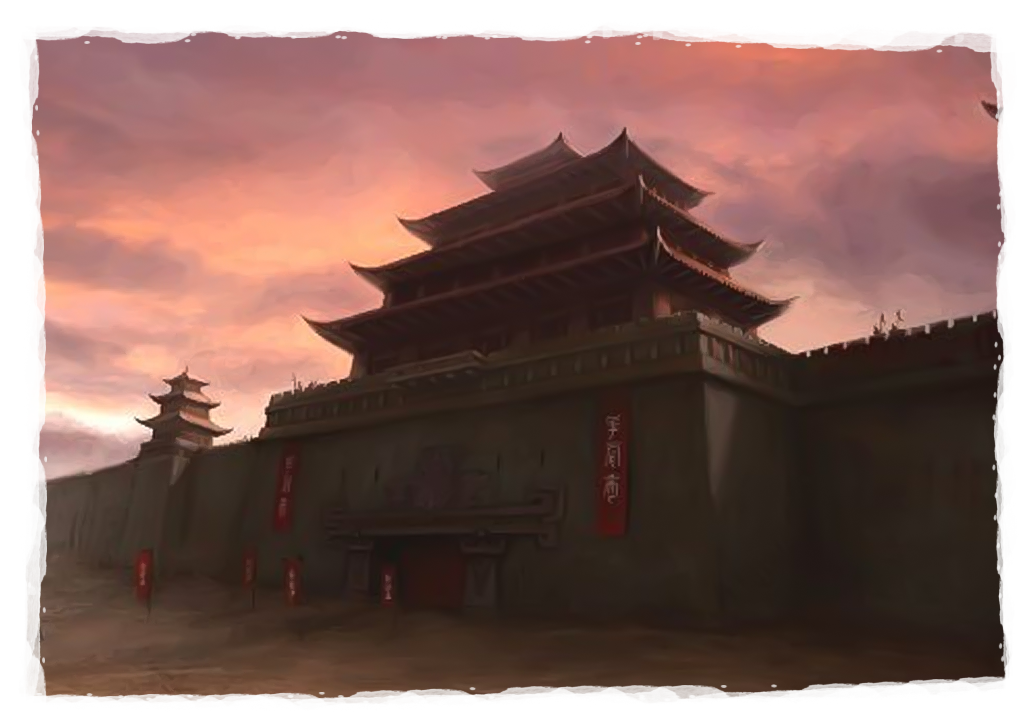
Hao-Shin Soulseeker
This bloody period in history saw the rise of Hao-Shin Soulseeker, a forgotten blood-line descendant of Prince Lei-Shun, who lived a reclusive life as a wandering spiritualist. He spent his days secretly freeing captives and whisking them away to small, free villages deep in the Taolong Forest, away from the gaze of the Oni Empire which was more occupied fending off centaurs than recapturing one or two escaped slaves amidst the thousands already in chains. Hao-Shin was practiced the old teachings and rituals of Suong-Mei. Out of desperation, he meditated and prayed to the land and heavens for a way to help the enslaved peoples see a way to freedom.The Three Dragon Advisors
Hao-Shin experienced a potent vision: from the stars appeared three young spirit dragons—a storm dragon, a fire dragon, and a river dragoness. Appearing in humanoid form, they told him they had seen the cruelty of the oni and the brutality of the centaurs. As his advisors, they would help him unite the subjugated peoples, and so long as they remained by his side, the people of Khitang would remain free and the land would become prosperous once more. Hao-Shin agreed and made a pact with the three dragons. When he awoke the next day, three regal orcs greeted him as his new advisors. The four meditated on the slavery of Hao-Shin's people. Gheng-Ra's extreme cruelty toward the slaves of the Oni Empire was not a sign of its strength. It was a symptom of its weakness. The oni had grown dependent on their servants; without them, they were nothing.The First Monk
The dragon pact extended Hao-Shin's youth far beyond any mortal life, and Hao-Shin devoted decades to exposing the oni’s vulnerability. Slaves were denied weapons under punishment of death, thus the three advisors taught Hao-Shin to use his own body as one. To elude the ever-watchful eyes of the oni, he was taught to disguise his attacks as an artistic dance that mimicked the serpentine grace of the dragons.
The Orc Uprising
Their first major victory came when they took back Xuin-Lu city from their oni oppressors. The rebels successfully drove the oni away from the island's shores and enabled the rebels to form a base of operations from which to further strike. This single victory not only heartened the orc monks but also drew other races to the rebellion. The yunzu and the tengu joined the effort to topple the Oni Empire. Bit by bit, the revolution grew. Hao-Shin was right: the oni had grown too reliant on their slaves, and as more rebelled, the Empire fell into chaos. The wily yunzu dug tunnels to infiltrate the mightiest oni strongholds, and their warlords launched aggressive raids against oni supply lines. The tactical minds of the tengu outwitted oni battle lines, telling Hao-Shin’s forces where to strike and when to run. Most of all, Hao-Shin's dragon advisors were a force of nature unto themselves and brought to heel even the greatest of the oni's infernal magic. The three dragons also lay to waste the great stampeding hordes of centaurs to the north, who saw the
Age of the Dragon
With Hao-Shin's lineage upon the throne under the tutelage of the three dragon advisors, the Empire of the Celestial Dragon entered a time of peace, prosperity, and growth for many years. Art, music, and culture thrived, and Hao-Shin took steps to secure this lasting unity. To prevent one single province from gaining dominion over the Black Vault and the Infinus Maledus, he oversaw the construction of a massive temple in the center of the Jade Sea—between Kin-Zhu Isle and the mainland—that scraped the heavens. This became the Temple of the Celestial Dragon. The Harvest Festival became the Day of the Dragon, a celebration of the new year to ward off evil spirits. The Black Vault was relocated underneath this temple, and the three legendary swords first commissioned by Tao Shun were given to three of Hao-Shin's wisest sons and daughters, hand-picked by the three advisors and tested constantly for their purity of mind and spirit. Balance was required in both character and deed. Yin and Yang, as taught by the descendants of Suong-Mei. The Celestial Bureaucracy. To keep the secret of the three dragon advisors safe from the rest of the populace, the Celestial Beurecracy was formed from a collection of Hao-Shin's closest, most trusted friends and confidants. Beyond himself, these were the only individuals who knew of the advisors' true nature. Hao-Shin Soulseeker's only daughter, Kai-Ling, became the Princess of the western provinces—once the seat of oni power—and oversaw Xiang-Xoh's transformation into a grand temple city. Its glistening, golden pagodas across the mountains blossomed into their own wind-swept settlements. The storm dragon held dominion over the mountains, keeping the local communities safe from oni incursions. Hao-Shin's eldest son, Mu-Feng took over rulership of the eastern provinces where the fire dragon advised the Prince on matters of tactics and military strategy against the centaur's efforts to destroy the northern wall. Under the fire dragon's advice, Mu-Feng reinforced the great bastion and named it the 'Dragon's Spine Wall'. Lao-Feng Soulseeker was Hao-Shin's youngest son, and he took on the most daunting role of all: the development of Xuin-Lu, the new capital of the Empire. The insight of the river dragoness provided the necessary wisdom for the young Prince to craft the perfect metropolitan port city, and with her help, great canals and across Kin-Zhu Isle brought in trade from across the new Empire. With clever diplomacy, they opened Khitang to the wider world, bringing in trade from all corners of the globe. Legends even say that the two fell in love and modern playwrights sing poems of their secret affair.The Jade Storm
As time passed, the descendants of the Soulseeker dynasty ruled their own kingdoms within the united Empire and the Dragons continued to advise each of them. However, the rise of Suto Bloodfang changed the Empire's leadership forever. The Bloodfang line was a noble one. It claimed ancestry from some of the greatest Toshui warriors in Emperor Tao Shun's most elite Imperial Guard. The line was kept pure, and for hundreds of years, every son became a member of the guard.
An Empire Reborn
With no true heirs to the throne, the dragon advisors, wounded from the storm, took it upon themselves to keep the Empire from once again falling to chaos. To keep their oath to Hao-Shin Soulseeker, the siblings plead for aid and called upon their father, who had guided them throughout their lives from afar. An ancient celestial dragon descended from the stars and took humanoid form as his offspring did. He commanded they go to the three provinces and restore order while he dealt with the fallout wrought by the Infinus Maledus. The accursed book that had been the cause for so much death, loss, and pain was temporarily moved to the deepest vault beneath the Imperial Palace where it stayed for many years. Eventually, the great Celestial Dragon was able to negotiate with the Sun Ward of the neighboring Kingdoms of Nioba to take the book and lock it away forever. Meanwhile, his children stifled uprisings, diplomatically resolved tensions, reinvigorated industries lost to the Storm, and quelled opportunistic raids by hostile tribes of oni and green-skins. They gradually, and reluctantly, settled into their roles as administrators of the three provinces. The great Celestial Dragon took up the title of Dragon Emperor and oversaw the Empire as it settled into an apprehensive peace. The dragons had averted a crisis, but now came the task of maintaining this stability. Through many dynasties, they took on numerous humanoid forms and carried out long-term plans to ensure the Empire's lasting security. The Celestial Beauracracy protected their true identities and collaborated with each of the dragons' different forms over many decades. The Jade Storm's effects were still felt even centuries later. Though Xuin-Lu grew to be the world's largest metropolis, much of it became ridden with crime, poverty, and slum-like living conditions. The Kao-Tun crime syndicate came to rule Xuin-Lu's deep and labyrinthine undercity, despite the Imperial Guard's best efforts to stifle it. Many creatures were affected by the Jade Storm, and still to this day, new mutations are being discovered. Still, the dragons have since protected the Empire from many threats. During the War of the Undying , when the dead across the world rose from their graves in uncountable numbers, Khitang was one of the world's hardest-hit regions. But despite the undead's vast numbers, the dragons devastated each and every outbreak with raw power and ingenious creativity. During the war, the Dragon Emperor directed the creation of titanic golems wrought from magical terracotta and jade mined from the now-frozen Jade Sea. They wandered across Khitang, bringing destruction to the Empire's undead foes. The fire dragon of the eastern provinces bolstered the Dragon's Spine Wall with new and destructive siege weapons to stifle the stapedes of undead centaur that flowed from the Salen'jar Desert. In the centuries after the War of the Undying, the river dragon of the southern provinces oversaw massive restructuring efforts of the island's fishing industries to offset the destruction wrought by the Jade Storm and the petrified Jade Sea. New harbors were built, and she pioneered initiatives to rebuild portions of the massive city damaged by the cataclysmic event. The storm dragon oversaw the construction of the Celestial Library, of one of the world's foremost mage colleges and the only college where any apprentice wizard could learn the secrets of Astromancy. Her insight into the movements of the heavens enabled the Empire to predict the movements of the undead. Through the movements of the stars and heavens, some of the most esteemed students of the Celestial Library were the first to discover the orbits of the planes, contributing significant revelations to the 'Spheres of Influence' cosmological model. Today, the Empire of the Celestial Dragon is one of the oldest empires in the Known World and is by far one of the most powerful, rivaling the Tahosian Dynasty. It has become the most populous nation in history, with nearly three to four million people of all different races and creeds calling its lands home. However, much like the Dynasty, and unlike the Commonwealth, the Empire of the Celestial Dragon has largely remained insular and isolationist from the rest of the world, as its economy is largely self-sufficient. While it is not uncommon for Khitang to engage in overseas trade, such is rare. Today, it relies on overseas merchants to travel to far-flung shores by boat, or to the Dragon's Spine wall via the dangerous Jade Path. The rare commodities, silks, jade, unique technologies, and magics exported from the Empire will often find their way into the hands of wealthy western nobles and collectors. Likewise, commodities imported into the Empire from overseas are regarded with equal curiosity. Recent innovations in technology imported from Meyland have paved the way for extensive quarries and mining operations into the Jade Sea, and it has been discovered that the magical veins of this jade might be used as a unique power source. Some inventive minds have considered turning the Empire's greatest tragedy into its greatest boon.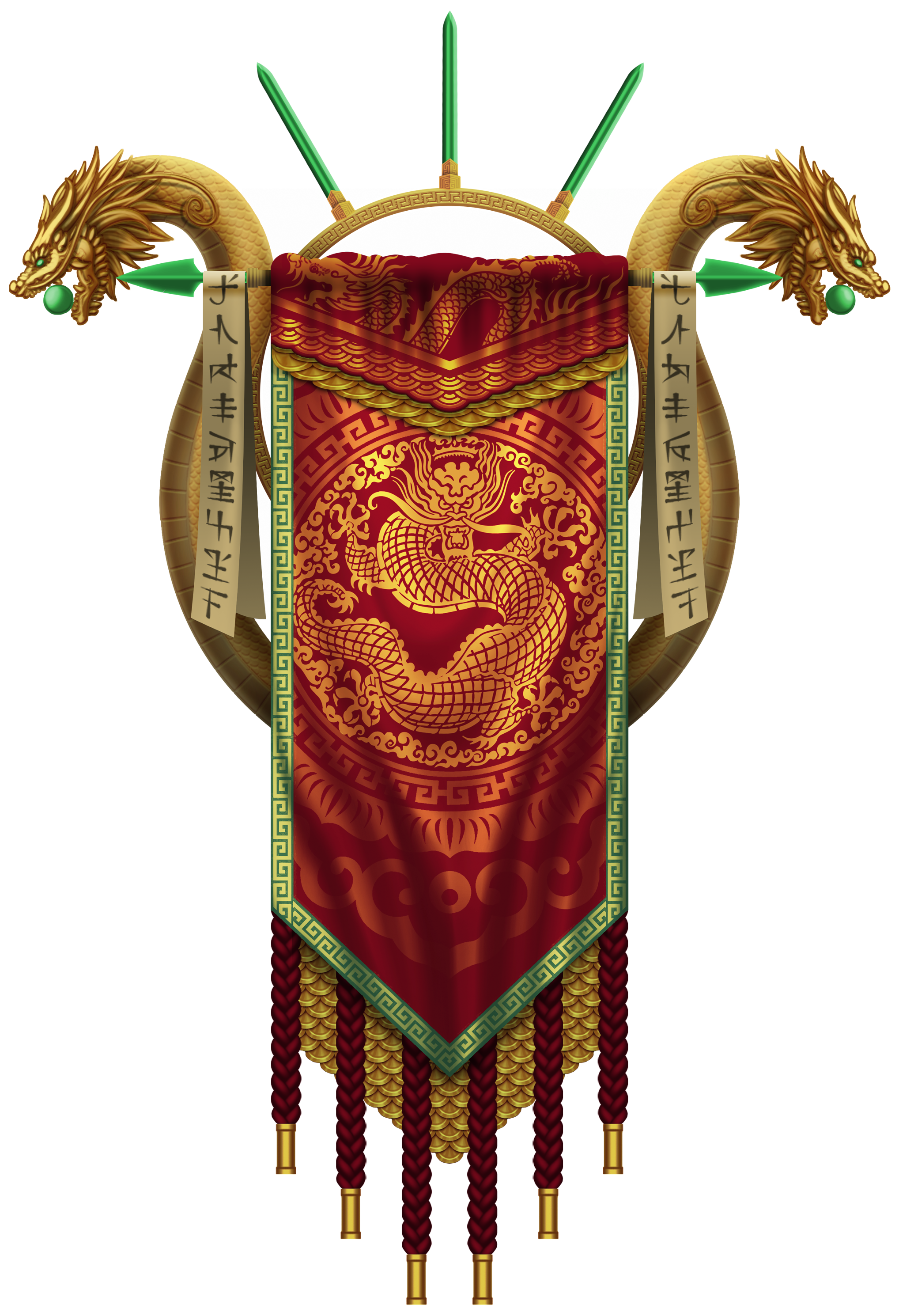
Founding Date
C. -2,500
Type
Geopolitical, Empire
Capital
Alternative Names
The Empire of Stars, Kingdom of Dragons, Grand Empire of Xuin-Lu, Kingdom of Jade
Predecessor Organization
Training Level
Elite
Veterancy Level
Decorated/Honored
Demonym
Khitanese
Leader
Leader Title
Government System
Monarchy, Absolute
Power Structure
Feudal state
Economic System
Market economy
Currency
Like most places in the world, the Empire of the Celestial Dragon uses the Gold Standard Currency system. Coins, especially gold coins, are typically engraved with visages of dragons.
Location
Official Languages
Neighboring Nations
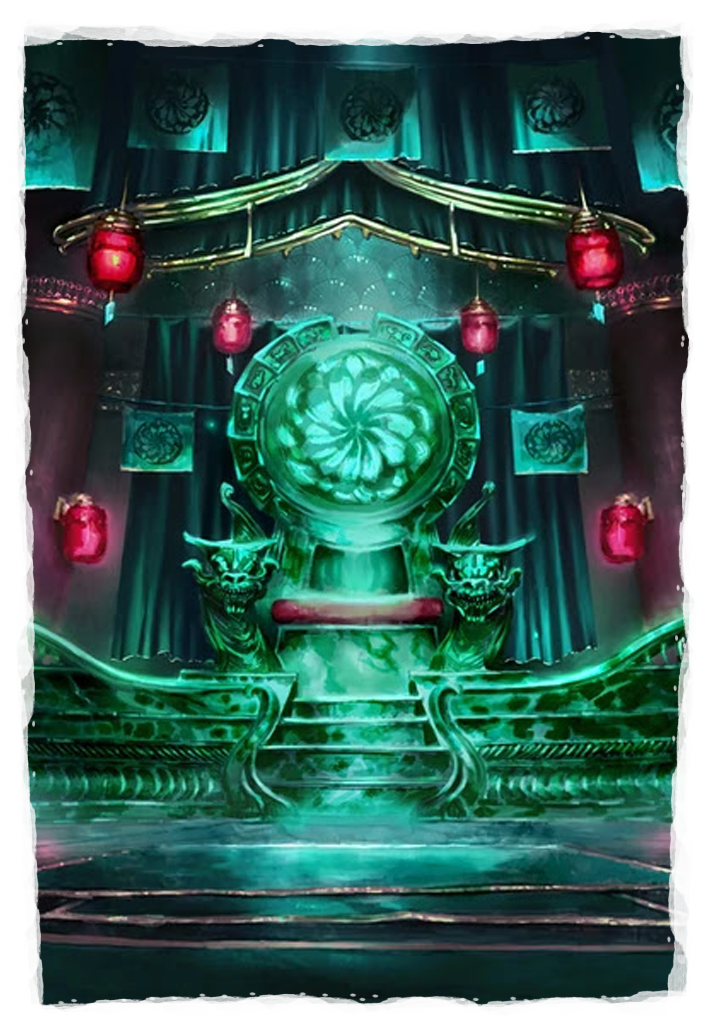
The Jade Throne
Mined from the most valuable veins of magical jade from the Jade Sea, the Jade Throne is the seat of power for the Dragon Emperor, and finds itself located at the very apex of the heavily-guarded Imperial Palace. One can expect to find the throne room guarded by a hundred Palace Guards at any one time. More daunting still are two enormous jade serpents that sit petrified at the foot of the throne, which will awaken at the Emperor's command. It is said that their breath possesses the ability to turn those who threaten the Emperor's life into solid jade.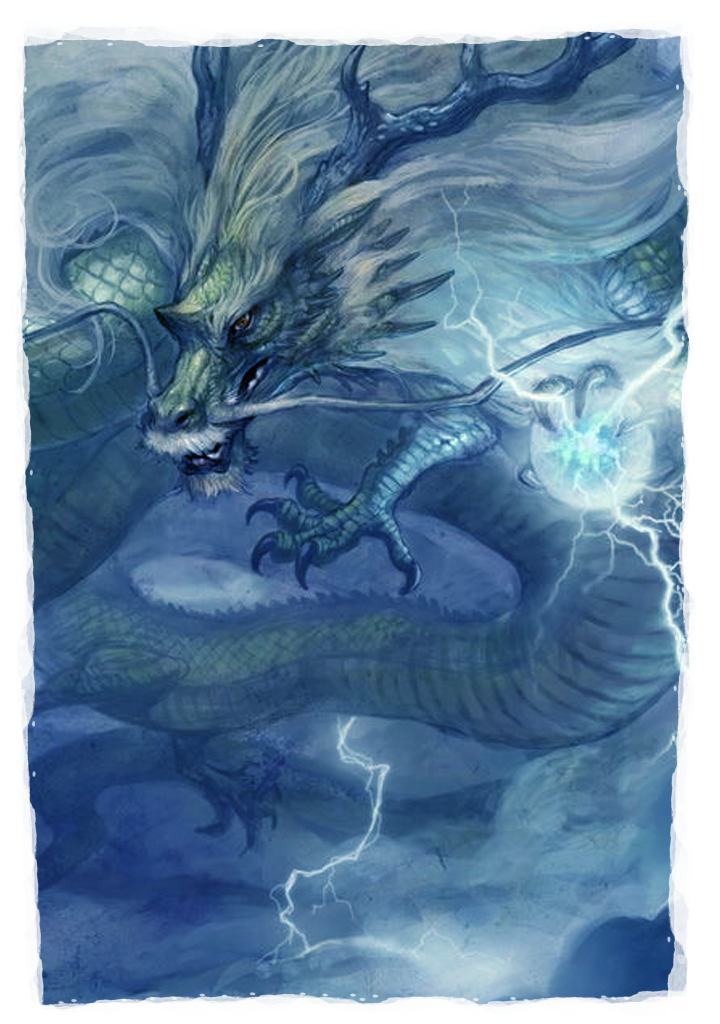
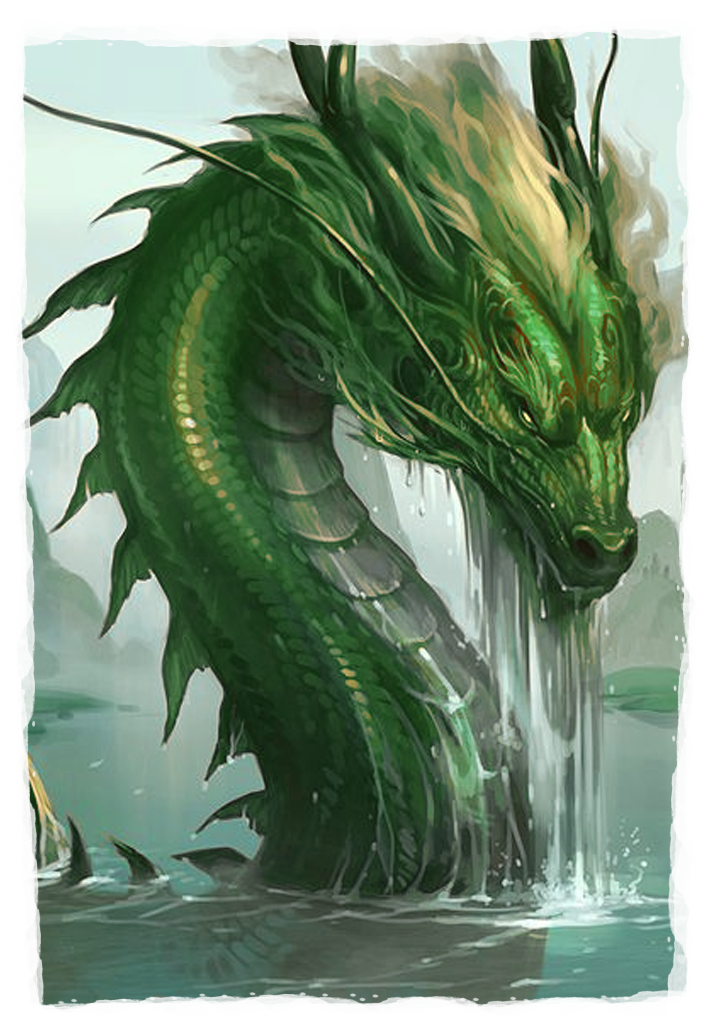
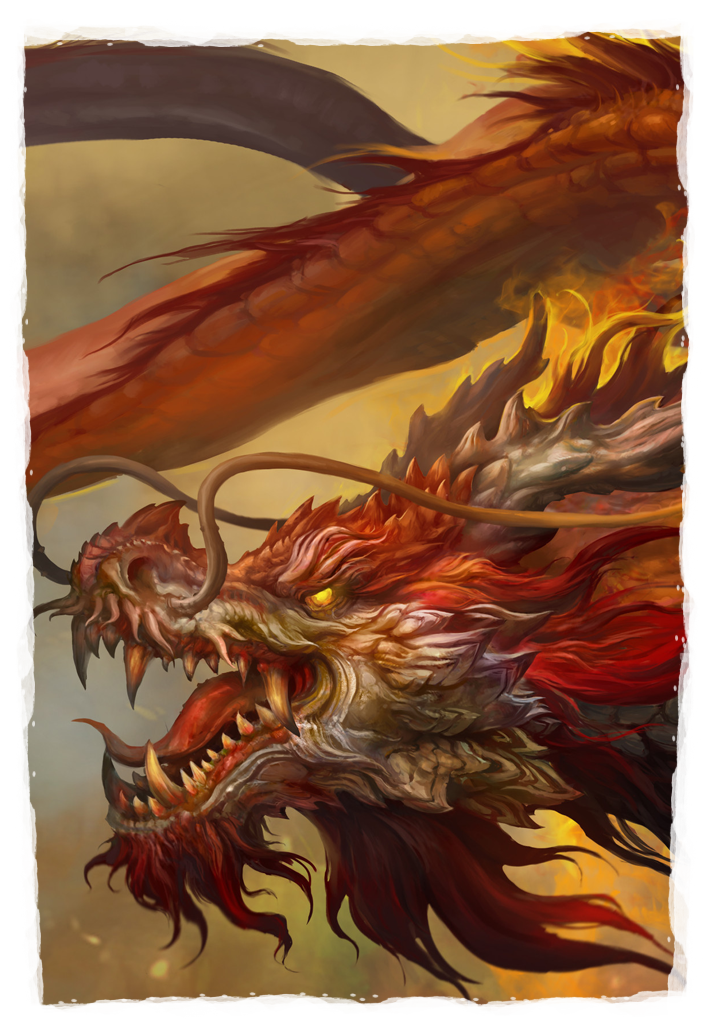

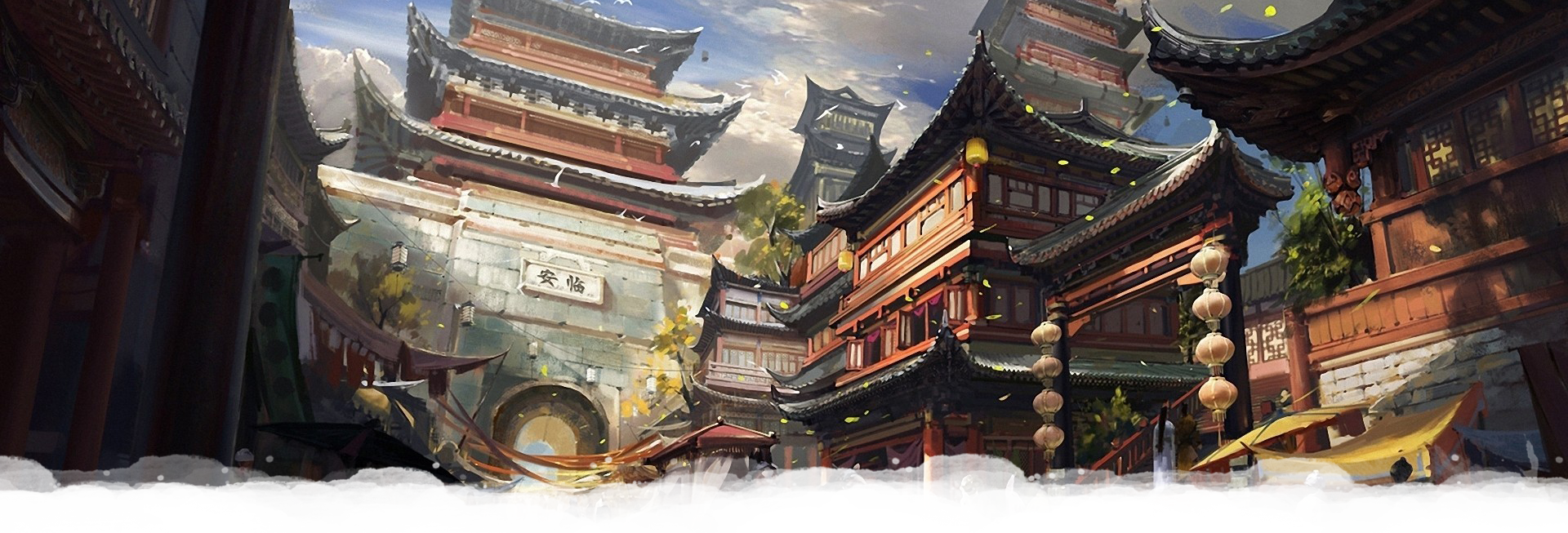

Comments